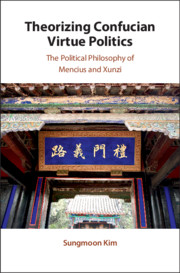Book contents
- Theorizing Confucian Virtue Politics
- Theorizing Confucian Virtue Politics
- Copyright page
- Dedication
- Contents
- Preface
- Conventions
- Introduction
- Part I Confucian Constitutionalism
- 1 Interest, Morality, and Positive Confucianism
- 2 Virtue, Ritual, and Constitutionalism
- 3 Before and after Ritual: Moral Virtue and Civic Virtue
- Part II Wang, Ba, and Interstate Relations
- Conclusion: Between Old and New
- Bibliography
- Index
1 - Interest, Morality, and Positive Confucianism
from Part I - Confucian Constitutionalism
Published online by Cambridge University Press: 04 November 2019
- Theorizing Confucian Virtue Politics
- Theorizing Confucian Virtue Politics
- Copyright page
- Dedication
- Contents
- Preface
- Conventions
- Introduction
- Part I Confucian Constitutionalism
- 1 Interest, Morality, and Positive Confucianism
- 2 Virtue, Ritual, and Constitutionalism
- 3 Before and after Ritual: Moral Virtue and Civic Virtue
- Part II Wang, Ba, and Interstate Relations
- Conclusion: Between Old and New
- Bibliography
- Index
Summary
Confucianism is sometimes understood as an ethical system that consciously opposes the pursuit of material interest. The opening page of the Mengzi is most telling in this regard: upon King Hui of Liang’s question of how to make his state profitable, the quintessential political question that no sensible political leader can afford to avoid, Mencius responds, “Why must you mention the word ‘profit’ (he bi yue li* 何必曰利)? All that matters is that there should be ren and yi.”
- Type
- Chapter
- Information
- Theorizing Confucian Virtue PoliticsThe Political Philosophy of Mencius and Xunzi, pp. 27 - 58Publisher: Cambridge University PressPrint publication year: 2019

